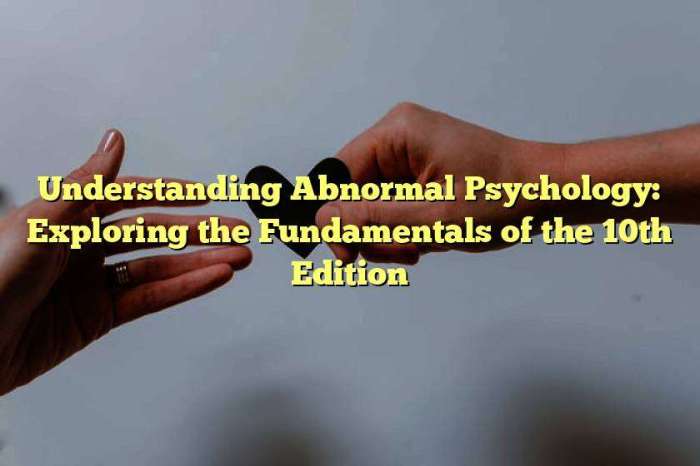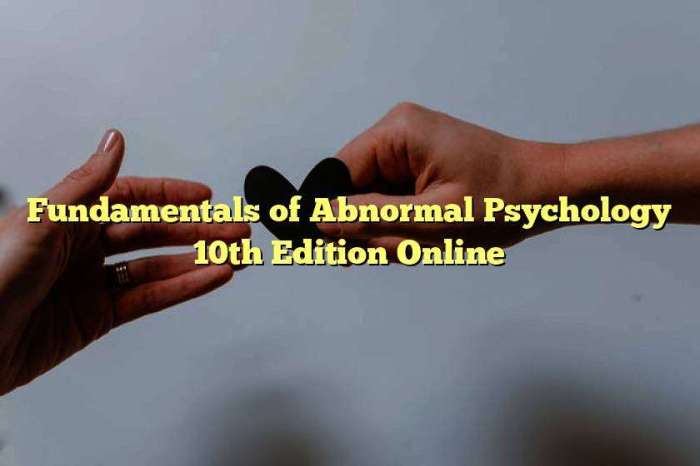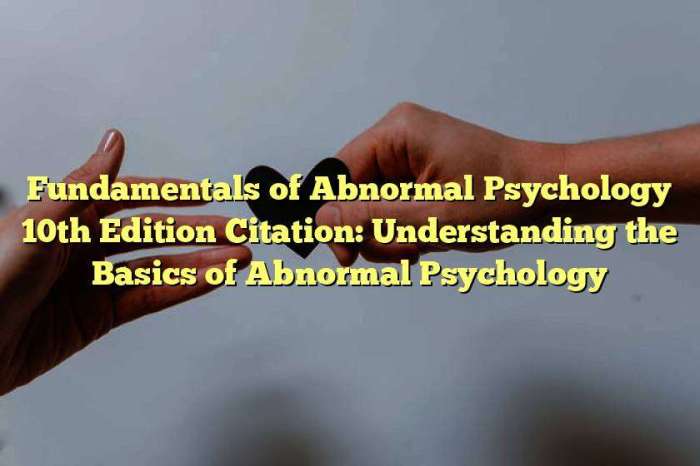Introducing Fundamentals of Abnormal Psychology 10th Edition, a comprehensive guide to the study of mental disorders. This edition delves into the intricacies of abnormal psychology, providing a thorough examination of its history, theories, assessment, diagnosis, and treatment.
From anxiety disorders to schizophrenia and personality disorders, this book covers a wide range of mental health conditions. With its updated content and engaging writing style, Fundamentals of Abnormal Psychology 10th Edition is an invaluable resource for students, practitioners, and anyone seeking a deeper understanding of mental health.
1. Introduction to Abnormal Psychology
Abnormal psychology is the scientific study of abnormal behavior and mental disorders. It encompasses the assessment, diagnosis, and treatment of psychological disorders, as well as the understanding of their causes and risk factors.
The historical perspectives of abnormal psychology have evolved from supernatural beliefs to medical and psychological models. Current trends in the field include the use of evidence-based practices, the integration of biological and psychological approaches, and the recognition of cultural and contextual factors.
2. Theoretical Perspectives on Abnormality
There are several major theoretical perspectives on abnormality, each offering a different lens through which to understand and explain mental disorders.
Biological Perspective
- Emphasizes the role of biological factors, such as genetics, neurochemistry, and brain structure, in the development of mental disorders.
- Focuses on identifying the biological mechanisms underlying abnormal behavior.
Psychodynamic Perspective
- Focuses on the role of unconscious conflicts and early childhood experiences in the development of mental disorders.
- Views abnormal behavior as a manifestation of unresolved psychological conflicts.
Behavioral Perspective
- Emphasizes the role of learning and conditioning in the development and maintenance of abnormal behavior.
- Views mental disorders as maladaptive behaviors that are learned and reinforced.
Cognitive Perspective
- Focuses on the role of cognitive processes, such as beliefs, thoughts, and schemas, in the development and maintenance of mental disorders.
- Views abnormal behavior as a result of distorted or dysfunctional cognitive processes.
Sociocultural Perspective
- Emphasizes the role of social and cultural factors, such as poverty, discrimination, and trauma, in the development of mental disorders.
- Views abnormal behavior as a result of the interaction between an individual and their social environment.
3. Assessment and Diagnosis of Mental Disorders
Assessing and diagnosing mental disorders involves a comprehensive evaluation of an individual’s symptoms, history, and functioning.
The Diagnostic and Statistical Manual of Mental Disorders (DSM-5) and the International Classification of Diseases (ICD-11) are the primary diagnostic systems used by mental health professionals.
4. Anxiety Disorders
Anxiety disorders are characterized by excessive fear, worry, and avoidance behaviors.
Generalized Anxiety Disorder, Fundamentals of abnormal psychology 10th edition
- Persistent and excessive worry about a variety of topics.
- Symptoms may include muscle tension, fatigue, and difficulty concentrating.
Panic Disorder
- Recurrent, unexpected panic attacks characterized by intense fear and physical symptoms, such as chest pain, shortness of breath, and dizziness.
- May lead to avoidance behaviors and fear of having another attack.
Phobias
- Intense and persistent fear of specific objects or situations.
- May lead to avoidance behaviors and significant distress.
Obsessive-Compulsive Disorder
- Recurrent, unwanted thoughts (obsessions) and repetitive behaviors (compulsions) that are difficult to control.
- May cause significant distress and impairment in functioning.
5. Mood Disorders

Mood disorders are characterized by disturbances in mood, such as depression or mania.
Major Depressive Disorder
- Persistent sadness, loss of interest in activities, and feelings of hopelessness.
- May also include physical symptoms, such as fatigue, sleep disturbances, and changes in appetite.
Bipolar Disorder
- Characterized by alternating episodes of mania or hypomania and depression.
- During manic or hypomanic episodes, individuals may experience elevated mood, increased energy, and decreased need for sleep.
6. Schizophrenia and Other Psychotic Disorders
Schizophrenia is a severe mental disorder characterized by delusions, hallucinations, and disorganized thinking.
Schizoaffective Disorder
- Characterized by symptoms of both schizophrenia and a mood disorder.
- May experience episodes of mania, depression, or both.
Delusional Disorder
- Characterized by persistent, false beliefs that are not based on reality.
- Delusions may be grandiose, persecutory, or jealous in nature.
Schizophreniform Disorder
- Characterized by symptoms similar to schizophrenia, but lasting for less than six months.
- May progress to schizophrenia or resolve spontaneously.
7. Personality Disorders

Personality disorders are characterized by inflexible and maladaptive personality traits that cause significant distress or impairment.
Borderline Personality Disorder
- Characterized by unstable relationships, impulsive behavior, and intense emotions.
- May experience self-harm, suicidal thoughts, and difficulty regulating emotions.
Antisocial Personality Disorder
- Characterized by a lack of empathy, disregard for social norms, and a history of criminal behavior.
- May engage in manipulation, deceit, and aggression.
Narcissistic Personality Disorder
- Characterized by an inflated sense of self-importance, a need for admiration, and a lack of empathy.
- May exhibit grandiose fantasies, a sense of entitlement, and a desire for special treatment.
8. Substance Use Disorders
Substance use disorders are characterized by the compulsive use of drugs or alcohol despite negative consequences.
Alcohol Use Disorder
- Characterized by persistent and excessive alcohol consumption that leads to significant impairment in functioning.
- May include symptoms such as tolerance, withdrawal, and alcohol-related medical problems.
Drug Use Disorder
- Characterized by persistent and excessive use of drugs that leads to significant impairment in functioning.
- May include symptoms such as tolerance, withdrawal, and drug-related medical problems.
9. Treatment of Mental Disorders: Fundamentals Of Abnormal Psychology 10th Edition

There are various treatment options available for mental disorders, including psychotherapy, medication, and a combination of both.
Psychotherapy
- Involves talking with a trained mental health professional to address the underlying causes and symptoms of mental disorders.
- May include techniques such as cognitive-behavioral therapy, dialectical behavior therapy, and psychodynamic therapy.
Medication
- May be used to manage symptoms and improve functioning in mental disorders.
- Commonly prescribed medications include antidepressants, antipsychotics, and mood stabilizers.
10. Ethical and Legal Issues in Abnormal Psychology
Ethical and legal issues are of paramount importance in the assessment, diagnosis, and treatment of mental disorders.
Informed Consent
- Individuals must be fully informed about the risks and benefits of treatment before they can give their consent.
- Mental health professionals have a duty to ensure that clients understand the nature and purpose of treatment.
Confidentiality
- Mental health professionals have a legal and ethical obligation to maintain the confidentiality of client information.
- Exceptions may be made in cases of imminent danger to the client or others.
Duty to Warn
- Mental health professionals have a duty to warn third parties if they believe that a client poses a serious threat to themselves or others.
- This duty may override the obligation of confidentiality in certain circumstances.
Commonly Asked Questions
What is the scope of abnormal psychology?
Abnormal psychology encompasses the study, assessment, diagnosis, and treatment of mental disorders.
What are the major theoretical perspectives on abnormality?
The major theoretical perspectives include biological, psychodynamic, behavioral, cognitive, and sociocultural.
What are the different types of anxiety disorders?
Common anxiety disorders include generalized anxiety disorder, panic disorder, phobias, and obsessive-compulsive disorder.
What are the symptoms of schizophrenia?
Schizophrenia symptoms include hallucinations, delusions, disorganized speech, and impaired social functioning.
What are the different types of substance use disorders?
Substance use disorders include alcohol use disorder and drug use disorder.
